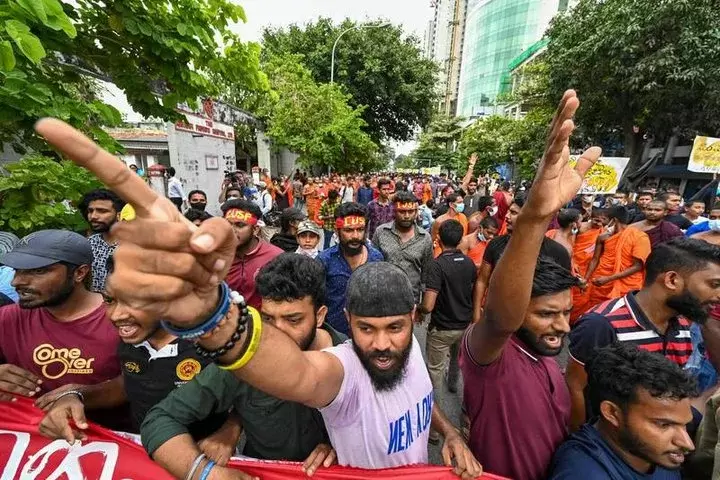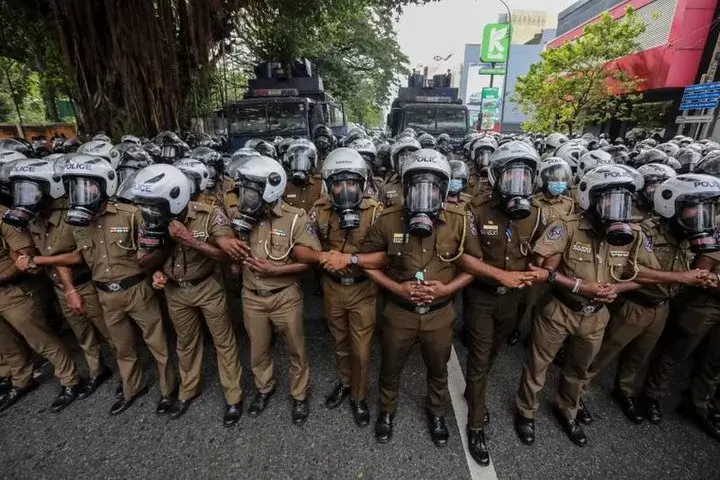|
Sri Lankan university students take part in a demonstration in Colombo on Aug. 18. Recent news of people overrunning the presidential palace in Sri Lanka, followed by President Gotabaya Rajapaksa fleeing the country, took Western media by storm. What is not reported is the ongoing police repression by the current president, Ranil Wickremesinghe. His latest attack took place on a peaceful protest Aug. 18 that was organized by the Inter-University Students Federation (IUSF) in Colombo, along with other progressive forces and artists. Witnesses say they were attacked unprovoked, and individuals were chased, beaten and arrested. Some of them were kidnapped by unidentified militia and held for hours in undisclosed locations. Many progressive organizations and union leaders have condemned the police repression and demanded immediate release of those who were arrested. They are also demanding an investigation into the incident. After Gotabaya’s resignation and exit, it was time for Sri Lankans to decide the next steps towards the future. There was hope of a real change in the country. However, this new hope was short-lived. It turns out that when Gotabaya left the country, he had carefully planned to secure his family’s and his close allies’ future by handing over power to official opposition leader Ranil Wickremesinghe. Even though Gotabaya is very unpopular at this time, he was elected by the majority of Sri Lanka’s radical Buddhist nationalists. His political party still holds a majority of seats in parliament. Furthermore, when it was time to select the new president, it was clear that the decision was carefully orchestrated in order to preserve the status quo. People’s demands disregardedWhen the people of Sri Lanka came out to the streets, they demanded not only the exit of the president, they demanded the exit of all members of the parliament, who maintained the corrupt system cycle after cycle. Their demands were very clear: They wanted the current government gone and those who were responsible for the crises and corruption prosecuted. However, these demands were blatantly disregarded by President Wickremesinghe in attempting to form a national government with his own agenda, so he can continue to stay in power without calling for a general election. So far he’s done this by getting votes from the former president’s parliamentary allies, promising to secure their futures and thus avoid prosecution. But all progressive forces in Sri Lanka are demanding that Wickremesinghe should not stay in power, unelected for the remainder of the term, which is three more years. He must start the election process. Since the uprising began on July 9, there have been many protests by various progressive forces. These protests have been brutally suppressed by Sri Lankan police, who portray the protests as a fascist rampage similar to the Jan. 6, 2021, attack on the U.S. Capitol. The current government in Sri Lanka is using the same methods that the U.S. often uses to track down and prosecute its political opponents. For example, they arrested the internationally recognized trade union leader Joseph Stalin and held him in custody for weeks. It was only after international pressure that his release was secured. Security forces try to disperse university students in Colombo, Sri Lanka. Media ignores repression To the surprise of many, these latest police repressions were not widely reported in the Western media. The news is not being prioritized by social media, and there is no mention by major outlets like CNN and BBC. The kind of media presence we saw leading up to the resignation of Gotabaya disappeared without explanation. Moreover, the current government, in attempting to appease the International Monetary Fund, is considering privatizing national assets in Sri Lanka. On top of that, the government has borrowed money from many pension/retirement funds that belong to the workers and trade unions and is now in the process of canceling 20% of those debts. This will significantly reduce retirement funds for people who worked their entire lives. After the Cuban Revolution, a journalist asked Fidel Castro why he didn’t kill the former dictator Batista. He explained that killing Batista wouldn’t change anything, since the capitalist class would simply replace him with another and the cycle would continue. “The only way we can change that is to change the system itself. And that’s what we did.” The uprising in Sri Lanka was not a revolution like in Cuba. It’s also true that Western forces took advantage of the situation and even manipulated the situation through social media. But no one can deny the fact that people rose and demanded change. It is the lack of real political organization that held them back. Progressive forces in Sri Lanka know this. They have been consistently speaking out and continue to reorganize the struggle in an attempt to build new leadership. Over the last 40 years, Sri Lanka lost generations of youth to the civil war and the rebellion during 1989-1991. Now, decades later, there is a whole generation of youth out of work and without any hope. They continue to come out against the repression. Therefore, there’s a real fear that the current government will resort to the brutal methods used during the repression of the 1989 rebellion. The silence of the Western media during this latest wave of repression is appalling. Authorthis article was republished from Struggle La Lucha. Archives September 2022
0 Comments
Leave a Reply. |
Details
Archives
July 2024
Categories
All
|


 RSS Feed
RSS Feed